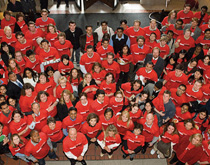The H. John Heinz III College gives new meaning to "outside the beltway"
When Amy Gergely's identity was stolen, she didn't even know it until she was called by a bill collector. She was a freshman at Penn State in the late 1980s, and identity theft was something most people hadn't even heard of. Gergely was about to get a crash course. Turns out, someone had used her name to get a credit card and take out multiple cash advances. The process to restore her good financial name was lengthy and frustrating—writing to a post office box to get a copy of her credit report, waiting weeks and weeks for it to arrive, and then working with the credit bureau and creditor to have the charges reversed. What took a thief mere days to destroy took Gergely months to repair.

With her credit once again intact, she went on to earn her college degree in political science and embark upon a career in corporate communications and public relations. By chance, almost 17 years after she experienced identity theft herself, she was working for Intersections, Inc., a company that offered consumer credit management and identity theft protection services. She rose quickly through the company ranks, starting out managing corporate communications, then moving into the role of senior manager of investor relations.
In addition to her expertise on identity theft issues with Intersections, by 2008 Gergely had built an impressive résumé of corporate communications experience in Washington, D.C., including stints as communications director for a congressional campaign and for a member of Congress, director of consumer communications for an insurance trade association, a strategic communications consultant, and director of communications for the American Security Project (a national security think tank that had two board members named to senior positions in Barack Obama's presidential administration). Along the way, she also became something of an authority on identity theft, publishing on the topic and appearing on national television networks, from CNN to CNBC to Fox News.
Although she had established herself as a successful communications professional in the private and public sectors, Gergely decided to make a mid-career switch. She wanted to move from communicating about policy to helping make policy, perhaps combating identity theft, which she personally endured in college, or—on a much broader scale—helping ensure national security, a top priority in the nation's capital since 9/11.
So, she made a bold decision—to step back from work and pursue an advanced degree that would prepare her to make a mark in the world of public policy. Looking for the best fit before taking the next step, she evaluated the reputations of various programs, their locations, financial assistance, and the amount of time it would take to earn her degree.
Carnegie Mellon's H. John Heinz III College's School of Public Policy and Management met all of her criteria. "Heinz offered a well-respected one-year track," she says. "I couldn't spare the time out of the workforce to do a traditional two-year program, and the financial incentives to attend Heinz were significant." She also liked the Pittsburgh location, looking to gain perspective from "outside the beltway" of the nation's capital so she could "escape—at least temporarily—the insular dialogue that often stifles creative solutions to our nation's problems."
In Heinz's accelerated master's program in public policy and management, often referred to as the MS3 program, she has combined public policy coursework with classes in information systems and management. So, in a given semester, Gergely studies topics ranging from globalization and management in a multicultural society (public policy) to information warfare and financial analysis (information systems).
She's precisely the kind of scholar Carnegie Mellon had in mind when it launched the newly named Heinz College last October. There, graduate students can combine the curricula of the public policy and management program with that of information systems and management. Funded by a $13 million grant from The Heinz Endowments, the college now offers nine master's degrees and three doctorates in fields ranging from healthcare and biotechnology to management and information systems.
"This groundbreaking new educational offering creates an academic path that enables graduates to realize the promise of technology and its impact on the public welfare," says Jared Cohon, Carnegie Mellon president.

That's something Gergely can wholeheartedly appreciate. When she started at Carnegie Mellon last summer, the public policy and management program resided in the basement of Hamburg Hall, and information science was located on the third floor. She was ahead of her time in making the trek from basement to third floor, as she took classes and worked on projects in both fields of study.
Plenty more students like Gergely are expected to follow, as the college continues to integrate public policy courses with information systems curricula, further encouraging cross-disciplinary collaboration and research.
On October 24, Carnegie Mellon formally celebrated the naming of the new college with an announcement and dedication ceremony. Former U.S. Treasury Secretary Paul H. O'Neill spoke, as did Teresa Heinz, chair of The Heinz Endowments and Heinz Family Philanthropies.
"You have come to this college at a time in which we confront global problems that are unprecedented," Heinz said to students. "The only way for us to succeed, as my husband knew well, is for graduates like you to be prepared to work across disciplines, ideologies, and party lines."
Gergely feels that, come graduation in May, she will be ready to influence policy on everything from the identity theft issues she dealt with personally to national security policy. She's already shuttling back and forth between Pittsburgh and D.C. to reestablish contacts as she prepares to launch her public policy career. She says the climate in the nation's capital has changed with the new presidency: Fresh opportunities have opened up. She believes it's an exciting time to be in public policy work.
Those at Heinz College would certainly agree.
Elizabeth May is an award-winning Pittsburgh-based freelance writer. She is a regular contributor to this magazine.



